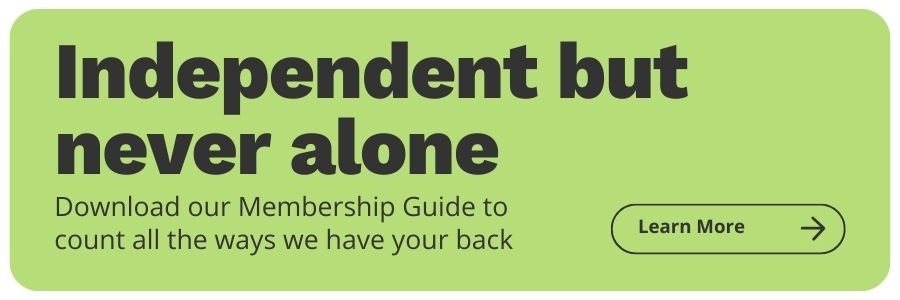These Related Stories
You are Enough: Overcoming Limiting & Failure Beliefs for Success and Satisfaction
Share this
Limiting beliefs and failure mindsets often act as invisible barriers, hindering both our professional success and personal fulfillment. A limited belief most will experience is imposter syndrome, the persistent inability to believe that one's success is deserved or has been achieved as a result of one's own efforts or skills. In my experience, working with clients and XYPN members, as well as navigating my own journey, I've witnessed how these beliefs can silently sabotage progress.
If you've ever found yourself questioning your worth, feeling inadequate, or suffering from other imposter syndrome symptoms, I invite you to join me in exploring strategies to shift these beliefs to a growth mindset instead.
What is a limiting belief?
A limiting belief encompasses the things you believe to be absolute that can impact your outlook, more specifically your growth and success. When you describe yourself you may hear limiting beliefs in the form of “I never…,” “I can’t…,” or “I’m not…” As a former middle school math substitute teacher, I often countered students' limiting beliefs with a simple yet powerful word: "yet." One of my favorite ways to reply to a child who would say "I'm not good at math" was to include "Yet. You are not good at math yet." Acknowledging that mastery takes time and effort, we open ourselves to growth and possibility.
What is a negative/failure belief?
Negative beliefs are about your own worth. I found it stated best by Joann Rideour in Changing Negative Core Beliefs to Change Your Life. “Negative core beliefs often include the belief that one is a failure, that they are not good enough, and that they are unworthy of anything.” These feelings of failure or unworthiness can stem from early life experiences and societal pressures. They may manifest in behaviors like self-sabotage and fear of pursuing our true desires. What's worse, they can be reinforced by external influences, perpetuating a cycle of doubt and limitation.
Due to this continuous cycle of self-doubt, change can be hard, but not impossible. According to Quin’c’allen Jones, ACSW, Mental Health Program Director at Clear Behavioral Health, "Negative core beliefs are often formed due to specific events or consistent patterns that negatively affect an individual. These beliefs become engrained without much conscious thought or action." By recognizing their presence and understanding their origins, we can begin to challenge and reshape them. From professional dilemmas like educational qualifications to personal struggles with imposter syndrome, each barrier presents an opportunity for growth and transformation.
These beliefs can be small and large. Citing some examples may help you realize some feelings you have had. Keep those in mind as we look at strategies to overcome your limitations. The first step is to recognize that what you are thinking isn’t all that uncommon and that change is possible.
Real World Applications:
1. “I am afraid no one will work with me because…”
Career changers and those without their CFP® designation frequently state this in the form of “I am afraid no one will work with me because…” Well, let me tell you, when you get a super clear vision of who you want to work with, and how you plan to serve them, and you create a fee structure that fits, you will bring your “why” to them and the right folks will say yes to working with you. Share your journey, keep gaining expertise, and work toward the designations, but know that relationships will grow as you gain those other elements.
2. Background
Some believe they need to have come from wealth to serve the wealthy. What you need to have is knowledge about investments, the struggles these clients face, and the goals they may have for their wealth, but this comes from education, experience, and intentional listening, not necessarily first-hand experience. Traditionally in the “dial for dollars” part of our industry it was quite helpful to know people with money. You sat down at a phone and called your dad, your grandma, your uncle, and your dad’s golf buddies, and down the line tried to gather assets to manage. No more. Now we focus on the goals, needs, fears, and the complete life a person wants to have. We help navigate into an unknown future using our knowledge of how markets often behave and what historically wise strategies for planning for the future are. You niche down so that you speak exactly to the hurdles your client is facing, no matter their wealth level or yours.
3. Anchoring
Unfortunately, our beliefs can hold us back even with modern success in a life-focused, niche-focused firm. More times than I want to admit I have helped an advisor create a successful business only to have them face the issues of believing themselves worthy of the success. One day you realize you live in a different socio-economic class than you were raised in, or perhaps your family and friends are still in. This can lead to doubting if you are worthy of your wealth, perhaps even worrying you have abandoned your roots, which can lead to self-sabotage.
To overcome this we have to look at what we are anchoring to. “I grew up poor” is not the same as “I am lower middle class.” One is a statement of a condition at the time, one is a label you are attaching to yourself. By labeling yourself you are anchoring to it and limiting your ability to move forward. Listen to what you say about yourself and change the dialogue to move yourself forward.
4. Transition to Entrepreneurship
Transitioning from a traditional employment model to entrepreneurship, for instance, may require shedding old identities and embracing newfound autonomy. You may have anchored to the job title you last had and forget that now you get to create your own title. You are the boss now. You make the title, the job description, and every speck of corporate culture in your firm. Build what you want and then embrace it!
5. Social Media-Fueled Self-Doubt
Similarly, navigating the comparisons and self-doubt fueled by social media requires a steadfast commitment to one's unique path. Much as I love social media and the connections you can make with colleagues online I also see some issues as people second guess their worth. Are they as cool as all the folks on YouTube, X, Instagram, or wherever they post their videos, blogs, and podcasts? They question if their work is as worthy when they build a business serving traditionally unserved folks and don’t quote their business in the managed assets framework. Even the way you serve clients can be a way of second-guessing. Is it all right if I don’t enjoy surge scheduling? Am I a bad planner because I want to do advice-only planning and help DIYers? (Spoiler: NO! You are fine!)
6. Anxiety & ADD/ADHD
Similarly, One of my personal non-favorites is wondering if you are a worthy financial advisor because you struggle to overcome anxiety or attention deficit issues or any of the myriad of ways that neurodiversity manifests. All of these things are fine! You all have to ride your own ride. In life and in business all of this can undermine your confidence and reinforce limiting beliefs. It’s bad enough that society can pile on, let’s work on how you can reinforce you are enough exactly as you are.
What can you do about it?
1. Reinforcement
Reinforcing your own value and worth is key. Dig deep into your curiosity about yourself to begin. The more you understand yourself, what triggers your negative beliefs, and where they began, the more you can begin to create strategies to address them. I have been reading a lot lately about neurodiversity because of a variety of family and work connections. The human brain is an amazing and yet also frustrating thing. There are infinite ways we can all grow, react, and also change. This is not meant to frustrate you, but to encourage you that no matter how many times you try to improve or change your behavior there is still room for change. Just keep trying. Keep being curious about yourself.
Let me preface this by saying that I am not a licensed therapist and nothing but a novice when it comes to neurodiversity, but I am a huge cheerleader when it comes to telling you that your brain is wonderful and unique no matter how you process information, make decisions, or relate to others in the world. There are a few strategies that can help you if you find you are struggling. Let’s review a few so you can get curious and decide what might work for you.
2. Mindfullness
Mindfulness is a wonderful skill to exercise. The more you practice the better you will be when the pressure mounts. As you find yourself experiencing negative beliefs, the more mindful you are the more you can create a space to acknowledge them and let them go. You do not need to dwell or chastise yourself, but again, be curious. What am I thinking that is negative? Where did this begin? Take time to acknowledge that your belief may have served you at one time. Perhaps it protected you or got you through a difficult time. Today it is no longer serving you, so you can take time to acknowledge it consciously, perhaps thank it for helping you, and let it go. The key is truly focusing and shifting thoughts consciously rather than just letting thoughts drift. Being patient with yourself as you endeavor to change your beliefs is critical. You will not be perfect as you work to change.
3. Affirmations
On a day-to-day basis make sure you create space for positive affirmations. While it would be great if the world overwhelmed you with those affirmations, the odds are you need to do it yourself. When you have a win, take a break and celebrate it. It doesn't have to be a long party, but a short pause, a look in the mirror, and saying out loud what you want to affirm. “I said no to a client who wasn’t a good fit. They will be in better hands with an advisor better suited to their needs.”, “I made time to take a walk when I was tired and just wanted to hit the couch after work.”, “This body can hike in the Alps. It is strong.” Whatever you need to affirm, take the time to do it.
Now, I know there’s controversy around Amy Cuddy and her body language findings, but I still love a good starfish pose. I use this when I am stressed or nervous or just need a good boost. It looks ridiculous, but I throw my arms out wide and tell myself something positive. Give it a try. Even if there isn’t specific science behind it, but it works for you, who cares?
4. W.O.O.P
Another great technique many of you use, but probably didn’t know has a name, is W.O.O.P. I wrote about this in a blog some time ago, but it’s worth another mention. How many of you put gym clothes out the night before so you get up and go to the gym first thing? That’s WOOP. Break it down and it stands for Wish, Outcome, Obstacle, Plan. You can apply it to networking events, responding to social media attacks on your engagement structure, and responding to client pushback on fees. You can apply it any time one of those nasty failure beliefs pop up. For example:
“I always get so overwhelmed at conferences, what’s the point of doing that to myself?
What do you wish the outcome would be? I’d like to not be as overwhelmed at a conference and feel like I have takeaways I’ll actually use.
What would that look like? I would have meaningful conversations and get new knowledge, but come home less exhausted so I can do better follow up and implementation.
What are the obstacles? I find it hard to say no to people, so I stay up too late. I get overwhelmed by the crowd. Sometimes, I miss the sessions I want because I lose track of time or I just want to go take a nap. Then I am so tired when I get home that I just catch up on email and work, and before I know it, I never implement any of my changes or ideas.
So what’s the plan? I will look at the schedule and make sure I have reminders set for sessions I want to attend as well as plan quiet time to recharge. I will set a specific time I want to be back in my room and set an alarm for that time so I get enough sleep. Before I go I will practice saying goodbye to people so that I have scripting more readily in my head when the time comes and I feel pressured to stay out too late. I will block my calendar after the conference to sleep in and have time set aside to debrief. I will ask a friend from the conference to be my check-in buddy, so that we can follow up every week or so to see how we’re doing on implementing things.
5. Support System
You can’t wait for the outside world for all of the positive changes, but you sure can lean on external sources for that reinforcement. Create a support system. This involves finding people who know you need reinforcement and are willing to cheer you on. This can be as simple as your Mastermind group or an Accountability or Support partner. I hesitate to use accountability in this context because it can stir up some negative connotations, but a single person you can check in with and get support from. This can also be in the form of your own family, a coach, or your colleagues. Just the other day a colleague popped into Slack after a quick Zoom call with “You're a DAMN good teammate. Thank you.” and that meant the world. We are creating space for one another to talk through work challenges in a safe and supportive way. It’s flipping awesome if I do say so myself!
Don’t hesitate to research therapy, coaching, or medication if you feel you need that support. Regardless of the source of your challenge, you can get the expert help you need to live the life you deserve. Check out the XYPN membership to find your people suited to support you: https://www.xyplanningnetwork.com/.
What’s next?
The journey to overcoming limiting beliefs and failure mindsets is a deeply personal one, yet it's one we don't have to embark on alone. As we've explored throughout this post, these beliefs often stem from early experiences and societal pressures, but they need not define our paths. By understanding the origins of our negative beliefs and recognizing their presence in our lives, we can begin to challenge and reshape them. From career transitions to struggles with imposter syndrome, each barrier presents an opportunity for growth and transformation.
What's crucial is reinforcing our own value and worth, digging deep into our curiosity about ourselves, and embracing strategies that support our mental well-being. Whether it's practicing mindfulness, engaging in positive affirmations, or utilizing techniques like W.O.O.P, there are myriad ways to cultivate a mindset of empowerment and self-compassion. Additionally, creating a supportive network of peers, mentors, or professionals can provide invaluable reinforcement along the journey.
Ultimately, seeking expert help such as therapy, coaching, or medication is not a sign of weakness but a proactive step toward living the life we deserve. Remember, change may be challenging, but it is always within reach. As we continue to explore and embrace our unique paths, let us affirm one simple truth: You are enough, just as you are.

About the Author
Arlene Moss gets a kick out of helping financial advisors get over being overwhelmed and take on their frustrations so their businesses soar. Arlene works to ensure XYPN members are able to help their clients prosper while creating a sustainable business model. Through XYPN Academy and one-on-one coaching, members get the support they need to grow their businesses and overcome the challenges that come their way.
Share this
- Advisor Blog (727)
- Financial Advisors (249)
- Growing an RIA (129)
- Business Development (101)
- Digital Marketing (97)
- Marketing (94)
- Community (82)
- Start an RIA (77)
- Coaching (76)
- Compliance (73)
- Running an RIA (72)
- Client Acquisition (68)
- Technology (67)
- Entrepreneurship (64)
- XYPN LIVE (64)
- Fee-only advisor (51)
- Sales (49)
- Bookkeeping (46)
- Client Engagement (45)
- Practice Management (44)
- Scaling an RIA (43)
- XYPN Books (43)
- Investment Management (41)
- Financial Education & Resources (36)
- Client Services (31)
- Employee Engagement (31)
- Lifestyle, Family, & Personal Finance (31)
- Market Trends (31)
- Journey Makers (26)
- Process (18)
- Niche (13)
- SEO (9)
- Career Change (8)
- Partnership (8)
- Sapphire (7)
- Transitioning Your Business (7)
- Emerald (4)
- Persona (4)
- Social Media (4)
- Transitioning To Fee-Only (4)
- Transitioning Clients (3)
- Onboarding (2)
- RIA (2)
- Transitioning to a Corporate RIA Affiliation (1)
Subscribe by email
You May Also Like

Sick Days For Business Owners: Why They're Necessary (and Will Help Your Business Grow!) - What Would Arlene Say?
Nov 2, 2017
4 min read

How Should You Define Success? What Would Arlene Say?
Jul 27, 2017
7 min read







